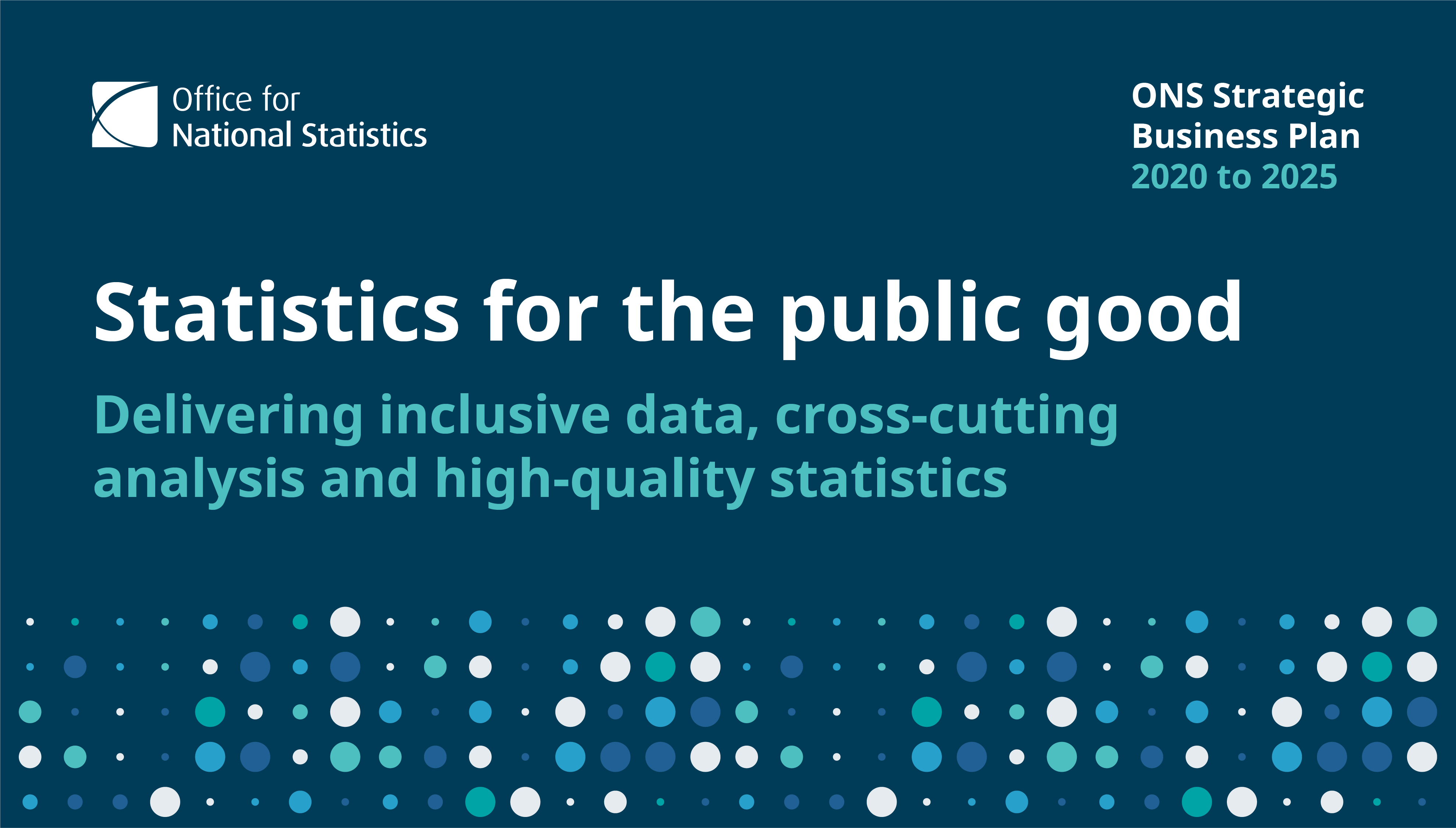National Statistician’s Foreword
The UK Statistics Authority (UKSA) strategy, Statistics for the Public Good, sets out the need for high quality data to inform the UK, improve lives and build for the future. The strategy sets out how the data revolution continues at pace and describes the prize for the statistical system, the Civil Service and the UK – if statisticians and analysts have access to the best evidence and can communicate effectively, helping to inform the country while reducing the potential for misrepresentation.
The Office for National Statistics (ONS) continues to have a lead role to play in this revolution on behalf of the UK. It benefits from the statutory independence of the UK Statistics Authority, supported by the Code of Practice for Statistics, key ethical principles and its ability to convene experts and analytical resources. The ONS also produces key reference statistics that are evolving quickly, in line with the economic and social fabric of the country, to show how the UK is changing and developing. It is also responsible for key aspects of the Digital Economy Act, which provides access to data in support of its remit from across the UK. The ONS also has an important role in ensuring that the country’s evidence base is inclusive and reflective of the full characteristics of the UK.
Our previous business plans spanned the emergence and evolution of the COVID-19 pandemic. The organisation has changed dramatically through this period – with a significant increase in demand for its statistics and analysis; and expansion of its remit to include a major focus on understanding the economic and social impact of the pandemic. The ONS also delivered the most successful Census collection operation there has been, in March 2021; developed the alpha and initial public beta stages of the Integrated Data Service Programme; and transformed its operations as a result of the pandemic to become a more flexible organisation.[1]
As we continue to deliver against the strategy in its third year, we will focus on key priorities for this year within framework of multi-year strategic objectives. These are:
- Continuing to deliver high-quality reference statistics to support the management of the economy and society – including inflation, labour market, GDP, public sector borrowing, population and migration, and crime.
- Delivery of the 2021 Census outputs, a transformed system of population and migration statistics and the business case for the future model for delivery of the Census benefits in Autumn 2023.
- Transformation of economic statistics – including radical new approaches to prices, labour market statistics, public sector finances and statistics on economic growth and development.
- Radical advances in the availability and usage of government’s data through the Integrated Data Service Programme including the development of data assets in support of levelling-up, net zero and public health.
- Transformation of the COVID-19 Infection Survey, in partnership with the Department for Health and Social Care and Health Security Agency, to a digital first model – facilitating ongoing management of the pandemic at significantly reduced cost while building resilience into the ongoing approach to collecting data in support of public health. The survey will be the key source of information to manage the risks of the pandemic going forward.
- Transformation of the crime survey, in partnership with the Home Office, to provide more granular data on crime and revised approaches to sensitive areas including violence against women and girls and child abuse.
- Building inclusivity and quality into statistics across the statistical system through the delivery of the findings of the Inclusive Data Task Force.
- Flexible analytical and data science capacity to provide rapid access to data in support of emerging areas of concern and/or access to new and novel data sources – including key public priorities such as:
- net zero, climate change and environmental measures beyond GDP, in partnership with the Department for Business, Energy and Industrial Strategy and Department for Environment, Food and Rural Affairs;
- COVID-19, cost of living, supply chains, labour market working with Cabinet Office and other Departments
- levelling-up, in partnership with the Department for Levelling Up, Housing and Communities; and
- refugee populations, linked to the Ukraine crisis, in partnership with the Home Office.
- The provision of UK wide data in support of the Union and the levelling-up agenda – in partnership with the Cabinet Office and the devolved administrations – focusing on survey transformation, implementing the Integrated Data Service for the UK as whole – improving data sharing and the inclusivity of UK wide data.
- Building the Analysis Function to be the centre for expertise for government across the analytical professions.
- Sustainable improvements to the resilience of the organisation through continuing improvements in our website, technology estate, security approach and flexible working environment. This includes a significant focus on inclusion and the places for growth agenda by expanding our presence in Darlington, Edinburgh and local communities across the country, alongside moving our Drummond Gate office to Marsham Street as part of the Civil Service’s rationalisation of its London estate.
- Ongoing drive to build the resource sustainability and financial efficiency of the ONS and broader statistical system – with a particular focus on automation, improvements in business process and improving the efficiency of government’s usage of data.
This Strategic Business Plan sets out how the ONS will lead the response to these challenges in line with the four pillars of Radical, Ambitious, Inclusive and Sustainable set out in the UKSA strategy. The key milestones for the delivery of the plan in 2022/23 are set out in section 6a below.
Professor Sir Ian Diamond
National Statistician UK Statistics Authority
[1] References to ‘government’ throughout this document will be taken to mean the UK Government / Westminster and the Devolved Administrations as appropriate
Back to top
